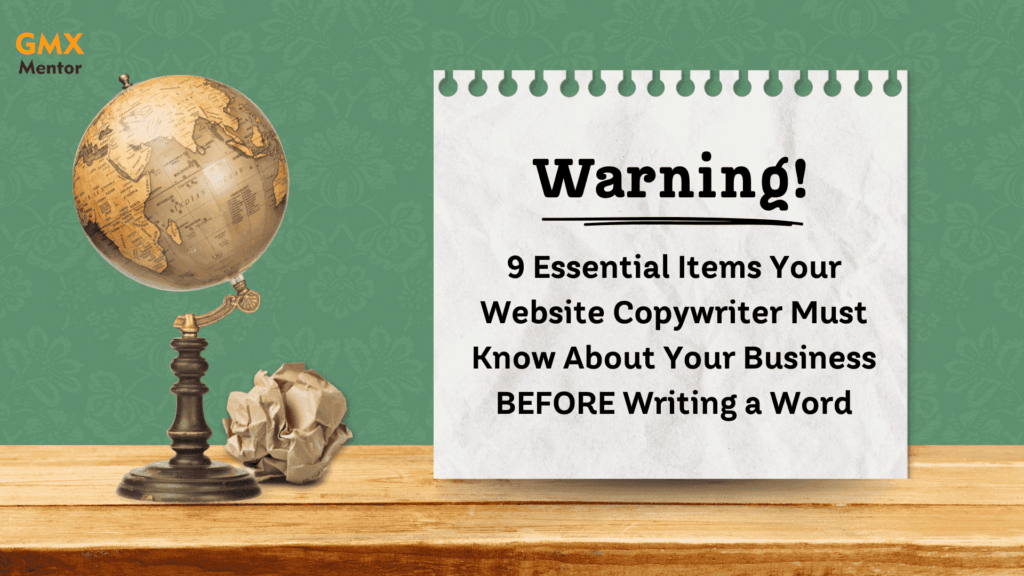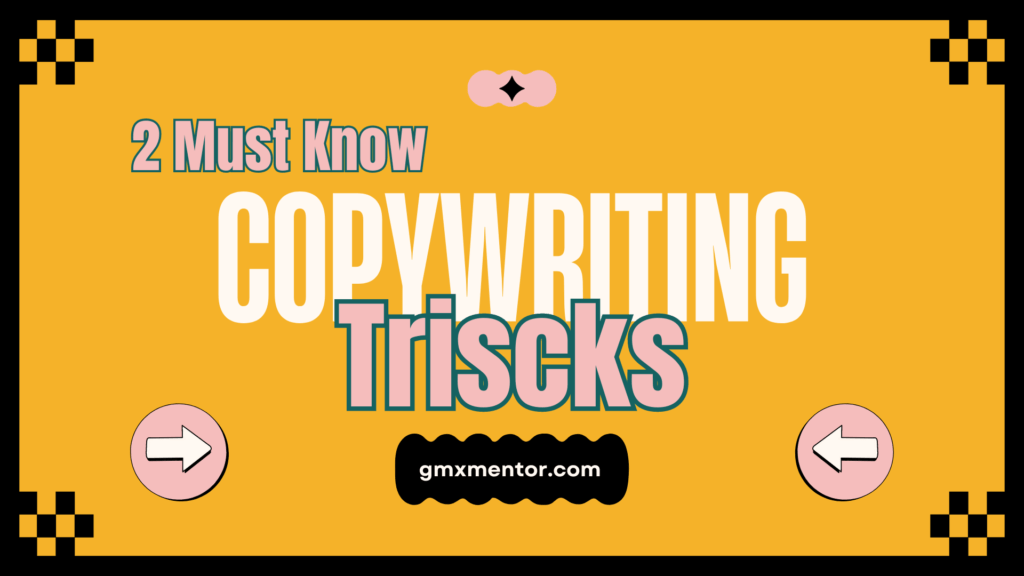9 Essential Items Your Website Copywriter Must Know About Your Business BEFORE Writing a Word
When you hire a website copywriter, it’s not just about finding someone with excellent writing skills. The best copywriters are expert interviewers, researchers, and marketers who delve deep into understanding your business before crafting content. This comprehensive understanding is crucial for creating copy that resonates with your audience, drives conversions, and ultimately achieves your business goals.
This is the Table of Contents You Can Go to Any Part of the Post just by Clicking Here.
In this expanded guide, we’ll explore the nine essential items your website copywriter must know about your business before writing a single word. By ensuring your copywriter covers these topics, you can be confident that your website will deliver the results you need. Must Know About Your Business BEFORE Writing
1. Project Objective: Define the Purpose of Your Copy
Before any words are put on paper (or screen), your copywriter needs to have a crystal-clear understanding of the project’s objective. The purpose of your website copy could vary depending on your business goals: Must Know About Your Business BEFORE Writing
- Sales Generation: Are you looking to drive immediate sales through your website? If so, your copywriter needs to focus on creating persuasive, action-oriented content that guides visitors toward making a purchase.
- Customer Education: Perhaps your goal is to educate potential customers about your products or services. In this case, your copywriter should create informative, value-driven content that positions your business as an authority in your industry.
- Brand Awareness: If you’re launching a new product or service, your copy might aim to raise market awareness. Your copywriter needs to craft compelling narratives that capture attention and build interest.
- Enhancing Company Image: Sometimes, the goal is to reinforce your brand’s reputation. Your copywriter should focus on messaging that highlights your company’s values, mission, and unique attributes.
Example:
If your goal is to enhance your company image, your copywriter might develop a brand story that showcases your company’s history, core values, and commitment to quality. This story would be woven into various parts of your website, from the homepage to the About Us page, ensuring consistency in your brand messaging. Must Know About Your Business BEFORE Writing
2. Target Audience: Understand Who You’re Writing For
To create effective copy, your website copywriter must have a deep understanding of your target audience. This includes demographics, psychographics, and behavioral characteristics:
- Demographics: Who are your customers? Consider factors such as age, gender, occupation, income level, and education.
- Psychographics: What are their interests, values, and lifestyle choices? Understanding what drives their decisions can help in crafting copy that resonates on a deeper level. Must Know About Your Business BEFORE Writing
- Behavioral Characteristics: How do they interact with your brand? Are they repeat customers, or are they discovering your brand for the first time?
Example:
For a luxury skincare brand targeting affluent women aged 35-50, the copywriter would craft content that speaks to their desire for premium quality, effectiveness, and a touch of indulgence. The tone would be sophisticated, the language polished, and the messaging would emphasize the exclusivity and benefits of the product.
3. Product Description: Know Your Offer Inside and Out
Your copywriter needs a thorough understanding of your product or service. This includes its features, specifications, and unique selling points. The more your copywriter knows about what you’re offering, the better they can highlight its value to potential customers.
Key Considerations:
- What are the core features of your product or service?
- How does it work?
- What makes it different from competitors’ offerings?
Example:
If you’re selling a high-tech kitchen appliance, your copywriter should explain not only its advanced features (e.g., smart connectivity, energy efficiency) but also how these features translate into real-world benefits for the user (e.g., convenience, cost savings, environmental impact).
4. Customer Benefit: Focus on What’s in It for Them
Customers don’t just want to know about the features of your product; they want to understand how it will benefit them. This is where the distinction between features and benefits becomes crucial: Must Know About Your Business BEFORE Writing
- Features describe what a product does or what it is.
- Benefits explain how the product improves the customer’s life.
Example:
Instead of simply stating that a laptop has a long battery life (feature), the copy should emphasize how this allows the customer to work uninterrupted for hours, even when on the go (benefit). Must Know About Your Business BEFORE Writing
5. Support for Benefits Claims: Provide Proof and Credibility
Claims without evidence can come across as empty promises. To build trust and credibility, your copywriter must provide proof to support the benefits they highlight. This could be in the form of:
- Testimonials: Real customer experiences that vouch for your product or service.
- Case Studies: Detailed examples of how your product or service solved a problem for a client.
- Data and Statistics: Hard numbers that demonstrate effectiveness.
- Awards and Certifications: Industry recognition that sets your brand apart.
Example:
If your software solution increases productivity by 30%, your copywriter should back this claim with data from user testing, client testimonials, or case studies that confirm the results.Must Know About Your Business BEFORE Writing
6. Competition: Know the Landscape
Understanding your competition is crucial for differentiating your brand. Your copywriter needs to know who your competitors are, what they offer, and how they market themselves. This allows them to position your product or service in a way that highlights your unique advantages.
Key Questions:
- Who are your main competitors?
- What are their strengths and weaknesses?
- How do they market their products or services?
- What can you offer that they can’t?
Example:
If you’re in the crowded market of fitness apps, your copywriter might emphasize unique features like personalized workout plans or integration with popular health devices, setting your app apart from generic options. Must Know About Your Business BEFORE Writing
7. Creative Consideration: Work Within the Boundaries
Every project has limitations, whether it’s budget, timeline, or specific brand guidelines. Your copywriter needs to be aware of these constraints to deliver content that aligns with your overall marketing strategy and meets your expectations.
Considerations:
- Budget: What resources are available for the project?
- Timeline: What are the deadlines for different stages of the project?
- Brand Guidelines: What tone, style, and messaging should be maintained?
Example:
If your budget is limited, your copywriter might suggest prioritizing certain pages or content pieces that will have the most significant impact, ensuring that you get the best results within your constraints.
8. Distribution: Plan How Your Copy Will Be Used
How and where your content will be distributed is essential for your copywriter to know. Whether it’s for a website, email campaign, or social media, understanding the distribution strategy helps tailor the content for maximum impact.
Distribution Channels:
- Website: Is the content for the homepage, product pages, or blog?
- Email: Will the copy be part of a newsletter, promotional email, or drip campaign?
- Social Media: Which platforms will the content be shared on?
Example:
If the copy is for an email campaign, the writer needs to craft compelling subject lines and engaging body text that drives readers to take action, whether it’s clicking through to your website or making a purchase.
9. Unique Selling Proposition (USP): Highlight What Sets You Apart
Your Unique Selling Proposition (USP) is what makes your product or service stand out in the market. Your copywriter needs to understand your USP to create content that clearly communicates why customers should choose you over the competition.
Key Questions:
- What is your USP?
- How does it address a specific need or pain point in the market?
- How can it be communicated effectively in your copy?
Example:
If your company offers a money-back guarantee that’s more generous than your competitors, your copywriter should make this a focal point in the copy, emphasizing the risk-free nature of the purchase.
Conclusion
Hiring a website copywriter is an investment in your business’s success. To maximize this investment, ensure that your copywriter thoroughly understands these nine essential aspects of your business. When a copywriter takes the time to dive deep into your project objectives, target audience, product details, and competitive landscape, the result is copy that not only resonates with your audience but also drives tangible results.
By focusing on these key areas, you’ll ensure that your website copy is not just well-written but strategically aligned with your business goals, ultimately leading to better engagement, higher conversions, and greater overall success.
FAQs
1. Why is it important for a copywriter to understand my project’s objective?
Understanding the project’s objective ensures that the copy aligns with your specific business goals. Whether your aim is to generate sales, educate customers, or enhance brand image, a clear objective allows the copywriter to craft content that effectively meets these goals.
2. How does knowing the target audience impact the effectiveness of website copy?
Knowing the target audience helps the copywriter tailor the message to resonate with the specific demographics, interests, and behaviors of your potential customers. This increases the likelihood of engaging the audience and driving the desired actions, such as making a purchase or signing up for a service.
3. What details about my product or service should the copywriter know?
Your copywriter should understand all the features, specifications, and unique selling points of your product or service. This knowledge allows them to accurately and compellingly describe what you’re offering, making it more appealing to potential customers.
4. Why is focusing on customer benefits more important than just listing features?
Customers are more interested in how a product or service will benefit them rather than just knowing its features. By focusing on benefits, the copywriter can create content that speaks directly to the customer’s needs and desires, increasing the likelihood of conversion.
5. What type of proof should a copywriter include to support benefit claims?
To build credibility, a copywriter should include testimonials, case studies, data, statistics, awards, or certifications. This evidence supports the claims made in the copy, helping to convince potential customers of the value and effectiveness of your product or service.
6. How does understanding the competition help in creating effective website copy?
By understanding your competitors, the copywriter can position your product or service in a way that highlights your unique advantages. This differentiation helps your brand stand out in a crowded market, making it more attractive to potential customers. Must Know About Your Business BEFORE Writing
7. What are creative considerations in copywriting, and why do they matter?
Creative considerations include constraints like budget, timeline, and brand guidelines. These factors ensure that the copy is not only creatively effective but also practical and aligned with your overall marketing strategy. Must Know About Your Business BEFORE Writing
8. How does the planned distribution of the content influence the copywriting process?
Knowing where and how the content will be distributed allows the copywriter to tailor the copy for specific channels, whether it’s for a website, email campaign, or social media. This ensures the content is optimized for the platform it will appear on, maximizing its impact.
9. What is a Unique Selling Proposition (USP), and why is it crucial in copywriting?
A Unique Selling Proposition (USP) is what makes your product or service stand out from the competition. It’s crucial because it gives the copywriter a clear focal point to emphasize in the content, helping to differentiate your brand and make it more compelling to potential customers. Must Know About Your Business BEFORE Writing
10. How can I ensure my website copy aligns with my overall business strategy?
To ensure alignment, work closely with your copywriter to communicate your business objectives, target audience, product details, and competitive landscape. Regularly review drafts and provide feedback to ensure the final copy meets your strategic goals. Must Know About Your Business BEFORE Writing
Follow Us On Social: Facebook
Tips to Increase Website Ranking and Traffic



